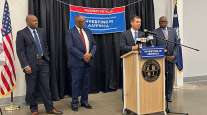Senior Reporter
Congress Unlikely to Address Infrastructure During Trump’s First 100 Days, GOP Says

This story appears in the Jan. 30 print edition of Transport Topics.
Republican leaders have yet to figure out when to proceed with legislation that would modernize freight corridors, structurally deficient bridges and old pipelines, Sen. John Thune (R-S.D.), policy chairman for the party in the Senate, told reporters on Jan. 25.
Thune and his GOP colleagues, who met Jan. 25-27 in Philadelphia, indicated an infrastructure package was not high on their priority list, even though President Trump sounded the alarm on the country’s reliance on “Third World” airports in New York and Senate Democrats unveiled a $1 trillion infrastructure measure earlier in the week.
The Republicans met to outline a 200-day action plan focused on reversing policy on health care, spending on social services and environmental regulations.
“An infrastructure bill will have to go through Congress. Obviously, it will have to be funded, and so Congress will have an opportunity to help shape that,” Thune said at a press conference broadcast via C-SPAN. “How infrastructure plays into that, we’re not sure yet. At this point, that’s probably a preliminary discussion to have.”
Thune, chairman of the Senate Commerce Committee, which has jurisdiction over trucking affairs, suggested a tax overhaul bill would be one approach for advancing an infrastructure funding package.
Speaker of the House Paul Ryan (R-Wis.) has yet to say when the chamber would take up a tax reform measure. He told reporters Jan. 26 that legislation that would authorize discretionary programs at agencies, such as transportation, would need to reflect the party’s philosophy.
“We are fiscal conservatives,” Ryan said at a separate press conference also carried by C-SPAN. “What it means is government should not live beyond its means.”
Senate Majority Leader Mitch McConnell (R-Ky.) has indicated he would oppose an infrastructure package that is not paid for and contributes to the national debt.
Prior to the Republican meeting in Philadelphia, Senate Democrats unveiled a $1 trillion infrastructure investment proposal that would avoid relying on private investments to finance big-ticket projects.
Senate Minority Leader Chuck Schumer (D-N.Y.) on Jan. 24 said the bill responds to Trump’s call to action on modernizing the country’s transportation network over 10 years.
Schumer added that his party’s legislation would create about 15 million jobs by authorizing $210 billion for projects for roads and bridges, $180 billion for transit programs, $110 billion for water infrastructure systems and $50 billion for railways. Speaking to reporters, Schumer did not detail the measure’s funding structure.
A plan Trump’s advisers promoted in October called for providing $137 billion in tax credits for the private sector to achieve a $1 trillion investment in infrastructure over 10 years.
“This bill would mean three things for this country: jobs, jobs and more jobs. And good-paying jobs to boot,” Schumer said. “As this bill hopefully moves forward, Democrats are going to fight for environmental and labor protections. We will not support tax credits for developers. We will insist that labor and raw materials come from America.”
The national association representing road builders applauded the Democrats but called for bipartisanship.
“Addressing the nation’s critical transportation needs in a meaningful way will require real, recurring, dedicated revenue streams that are complemented by private investment,” said Pete Ruane, CEO of the American Road & Transportation Builders Association. “For that reason, transportation revenue and tax reform should be an integral component of the comprehensive tax reform package being developed by the administration and Congress. President Trump’s leadership is key to making that happen.”
Marcia Hale, president of infrastructure advocacy group Building America’s Future, said the Democrats’ plan would address funding needs for roads, bridges, transit, ports, waterways and broadband.
“I hope this proposal will start the discussions that can ultimately lead to the development of a long-term infrastructure package,” Hale added.




